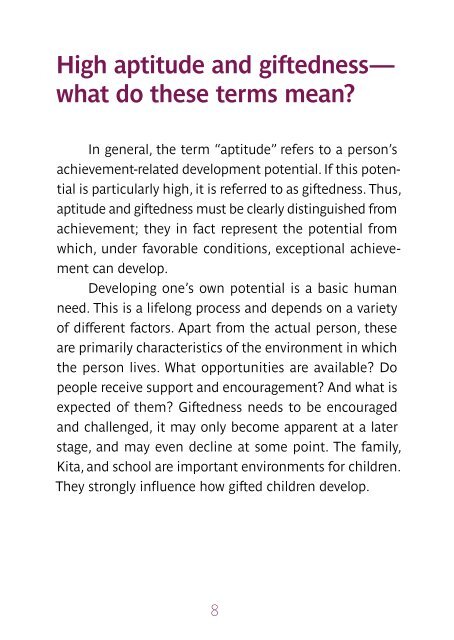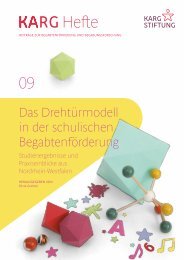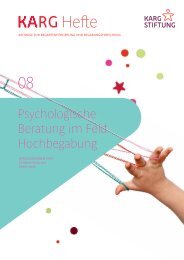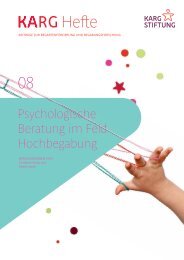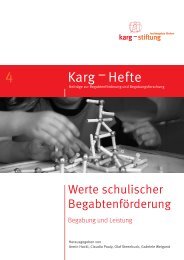FAQS: Frequently asked questions about giftedness
The Karg Foundation receives a lot of questions on the subject of giftedness—FAQs (Frequently Asked Questions)—far more often indeed than it did ten years ago. And this is a good thing! Many people involved in the educational processes of children have come to realize that giftedness can also be a fundamental personality trait of children and adolescents. The Karg Foundation wants to answer the questions you may have not only as educational and psychological professionals in educational institutions or working as educational providers, policy makers, or in training and further education institutes, but as parents and gifted people also: What is giftedness? How can it be identified? Who can provide advise for gifted children and their families? How can they be supported in the best possible way?
The Karg Foundation receives a lot of questions on the subject of giftedness—FAQs (Frequently Asked Questions)—far more often indeed than it did ten years ago. And this is a good thing! Many people involved in the educational processes of children have come to realize that giftedness can also be a fundamental personality trait of children and adolescents.
The Karg Foundation wants to answer the questions you may have not only as educational and psychological professionals in educational institutions or working as educational providers, policy makers, or in training and further education institutes, but as parents and gifted people also: What is giftedness? How can it be identified? Who can provide advise for gifted children and their families? How can they be supported in the best possible way?
Create successful ePaper yourself
Turn your PDF publications into a flip-book with our unique Google optimized e-Paper software.
High aptitude and <strong>giftedness</strong>—<br />
what do these terms mean?<br />
What must we be aware of in<br />
cases of extreme <strong>giftedness</strong>?<br />
In general, the term “aptitude” refers to a person’s<br />
achievement-related development potential. If this potential<br />
is particularly high, it is referred to as <strong>giftedness</strong>. Thus,<br />
aptitude and <strong>giftedness</strong> must be clearly distinguished from<br />
achievement; they in fact represent the potential from<br />
which, under favorable conditions, exceptional achievement<br />
can develop.<br />
Developing one’s own potential is a basic human<br />
need. This is a lifelong process and depends on a variety<br />
of different factors. Apart from the actual person, these<br />
are primarily characteristics of the environment in which<br />
the person lives. What opportunities are available? Do<br />
people receive support and encouragement? And what is<br />
expected of them? Giftedness needs to be encouraged<br />
and challenged, it may only become apparent at a later<br />
stage, and may even decline at some point. The family,<br />
Kita, and school are important environments for children.<br />
They strongly influence how gifted children develop.<br />
The most highly gifted people are individuals with<br />
extremely high ability scores, for example, people who are<br />
ranked in the top 1 % of their age group in terms of ability.<br />
By definition, these exceptionally and profoundly gifted<br />
individuals are extremely rare. This extreme minority<br />
status raises several challenges because, in most cases,<br />
conventional environments are not suitable for them.<br />
Difficulties are most apparent in the preschool and elementary<br />
school years, when children are highly dependent<br />
on their immediate social environment, that is, on parents,<br />
early childhood educators, or teachers recognizing their<br />
extreme <strong>giftedness</strong> and providing encouragement and<br />
support. In many cases, this requires exceptional, age-atypical,<br />
but precisely ability-appropriate opportunities, such<br />
as the possibility to enroll in university courses in later<br />
childhood. Without support, exceptionally and profoundly<br />
gifted children may hide their abilities or become lonely<br />
and not be able to make friends. With adequate support<br />
and encouragement, extremely gifted individuals generally<br />
develop very well. Most are very successful academically,<br />
have friends, and are very satisfied with their lives.<br />
8 9


